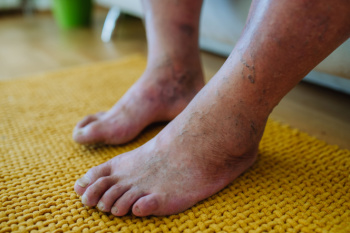 Diabetic patients often experience foot problems due to poor blood circulation and nerve damage, or neuropathy, caused by prolonged high blood sugar levels. Reduced blood flow can lead to slow healing of cuts and sores, while neuropathy can cause numbness, tingling, or a loss of sensation in the feet. This combination increases the risk of developing ulcers and infections, and injuries may go unnoticed. Diabetic foot symptoms include swelling, redness, warmth, and pain. Some individuals may feel a burning or sharp pain, while others might experience complete numbness. Foot deformities like hammertoes or Charcot foot can also develop causing discomfort and instability. To manage these issues, diabetic patients should maintain proper blood sugar levels, perform daily foot inspections, wear appropriate footwear, and practice good foot hygiene. Regular check-ups with a podiatrist are essential. If you have diabetes, it is strongly suggested that you seek comprehensive care from this type of doctor, who can perform regular foot evaluations and offer preventive measures tailored to diabetic needs.
Diabetic patients often experience foot problems due to poor blood circulation and nerve damage, or neuropathy, caused by prolonged high blood sugar levels. Reduced blood flow can lead to slow healing of cuts and sores, while neuropathy can cause numbness, tingling, or a loss of sensation in the feet. This combination increases the risk of developing ulcers and infections, and injuries may go unnoticed. Diabetic foot symptoms include swelling, redness, warmth, and pain. Some individuals may feel a burning or sharp pain, while others might experience complete numbness. Foot deformities like hammertoes or Charcot foot can also develop causing discomfort and instability. To manage these issues, diabetic patients should maintain proper blood sugar levels, perform daily foot inspections, wear appropriate footwear, and practice good foot hygiene. Regular check-ups with a podiatrist are essential. If you have diabetes, it is strongly suggested that you seek comprehensive care from this type of doctor, who can perform regular foot evaluations and offer preventive measures tailored to diabetic needs.
Diabetic foot care is important in preventing foot ailments such as ulcers. If you are suffering from diabetes or have any other concerns about your feet, contact Renee Rodriquez, DPM from Foot Clinic of South Texas. Our doctor can provide the care you need to keep you pain-free and on your feet.
Diabetic Foot Care
Diabetes affects millions of people every year. The condition can damage blood vessels in many parts of the body, especially the feet. Because of this, taking care of your feet is essential if you have diabetes, and having a podiatrist help monitor your foot health is highly recommended.
The Importance of Caring for Your Feet
- Routinely inspect your feet for bruises or sores.
- Wear socks that fit your feet comfortably.
- Wear comfortable shoes that provide adequate support.
Patients with diabetes should have their doctor monitor their blood levels, as blood sugar levels play such a huge role in diabetic care. Monitoring these levels on a regular basis is highly advised.
It is always best to inform your healthcare professional of any concerns you may have regarding your feet, especially for diabetic patients. Early treatment and routine foot examinations are keys to maintaining proper health, especially because severe complications can arise if proper treatment is not applied.
If you have any questions please feel free to contact our office located in Brownsville, TX . We offer the newest diagnostic and treatment technologies for all your foot and ankle needs.
